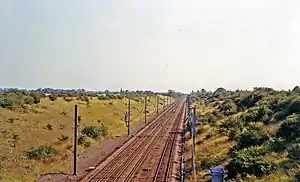Abbots Ripton | |
|---|---|
 Abbots Ripton station site | |
| General information | |
| Location | Abbots Ripton, Huntingdonshire England |
| Grid reference | TL222788 |
| Platforms | 2 |
| Other information | |
| Status | Disused |
| History | |
| Original company | Great Northern Railway |
| Pre-grouping | Great Northern Railway |
| Post-grouping | London and North Eastern Railway |
| Key dates | |
| 1 November 1885 | Opened as Abbotts Ripton |
| 21 January 1876 | Abbots Ripton rail disaster |
| 1938 | Renamed Abbots Ripton |
| 15 September 1958 | Closed for passengers |
| 5 October 1964 | closed for goods |
Abbots Ripton railway station was a railway station on the East Coast Main Line in the English county of Cambridgeshire. Although trains still pass on the now electrified railway the station closed in 1958. Due to the position of the station in a cutting, it had two platforms which were staggered. These served the fast lines only, though the goods lines ran around the back of each.
History
The station was opened by the Great Northern Railway (GNR) on 1 November 1885 as Abbotts Ripton.[1] The GNR became part of the London and North Eastern Railway (LNER) during the Grouping on 1 January 1923. Renamed Abbots Ripton in 1938,[1] the station then passed on to the Eastern Region of British Railways on nationalisation in 1948, and was closed by the British Transport Commission on 15 September 1958.[1] Despite the name change in 1938, the signal box nameboards and the lamp casings continued to display the former name throughout the station’s existence
Abbots Ripton rail disaster
An accident occurred at the future site of the station on 21 January 1876, when the southbound Flying Scotsman express train from Edinburgh to London was involved in a double collision during a blizzard. Heavy snow had frozen around the semaphore signal arms, causing them to stick in the "clear" position, as a result of which the driver of the express was not warned of the presence of a coal train which was backing from the main line into a siding. A collision occurred, and not long after, a northbound express from London to Leeds ran into the wreckage. There were thirteen fatalities, and 53 passengers and 6 traincrew members were injured.[2][3][4]
Routes
| Preceding station | Historical railways | Following station | ||
|---|---|---|---|---|
| Huntingdon North Line and station open |
Great Northern Railway East Coast Main Line |
Holme Line open, station closed | ||
Notes
- 1 2 3 Butt 1995, p. 11.
- ↑ Tyler 1876.
- ↑ Rolt & Kichenside 1982, pp. 114–120.
- ↑ Kichenside 1997, pp. 183–186.
References
- Butt, R.V.J. (1995). The Directory of Railway Stations. Yeovil: Patrick Stephens Ltd. ISBN 1-85260-508-1. R508.
- Jowett, A. (2000). Jowett's Nationalised Railway Atlas. Atlantic Publishing. ISBN 0-906899-99-0.
- Kichenside, Geoffrey (1997). Dixon-Spain, Charles (ed.). Great Train Disasters. Avonmouth: Parragon. ISBN 0-7525-2229-9.
- Rolt, L.T.C.; Kichenside, Geoffrey (1982) [1955]. Red for Danger (4th ed.). Newton Abbot: David & Charles. ISBN 0-7153-8362-0.
- Tyler, H.W. (23 February 1876). "The Report of the Court of Enquiry - Double Collision on the Great Northern Railway which occurred at Abbotts Ripton on the 21st January 1876" (PDF). Retrieved 26 May 2008.
External links
52°23′35″N 0°12′20″W / 52.39306°N 0.20556°W